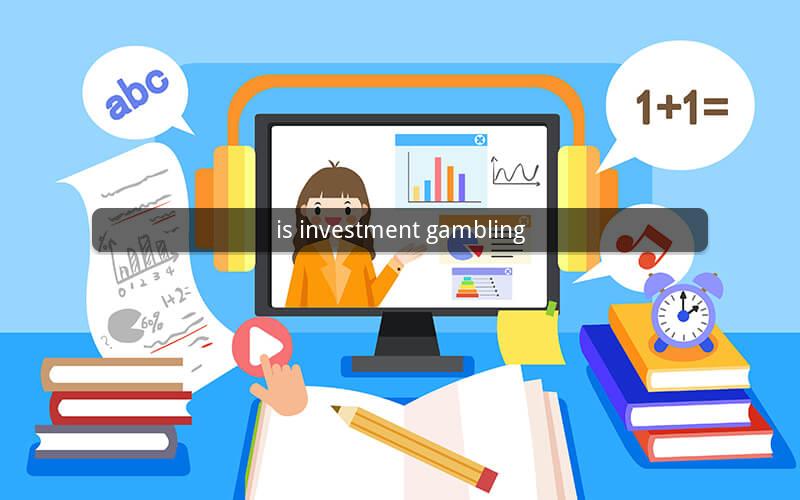
Table of Contents
1. Introduction to Investment
2. Understanding Gambling
3. Comparing Investment and Gambling
- The Nature of Risk
- The Role of Strategy
- The Element of Luck
4. Risks and Rewards in Investment
- Market Volatility
- Time Value
- Risk Management
5. Risks and Rewards in Gambling
- The Role of Chance
- The Psychological Aspect
- The Potential for Loss
6. The Importance of Education and Experience
7. The Role of Emotions in Investment and Gambling
8. The Impact of Technology on Investment and Gambling
9. The Ethical Considerations of Investment and Gambling
10. Conclusion
1. Introduction to Investment
Investment is the act of allocating money or resources with the expectation of generating an income or profit. It can take many forms, including stocks, bonds, real estate, and commodities. Investors seek to maximize their returns while managing risk.
2. Understanding Gambling
Gambling involves betting money or something of value on an event with an uncertain outcome, with the primary intent of winning additional money or material goods. It includes games such as poker, roulette, and slot machines.
3. Comparing Investment and Gambling
The Nature of Risk
Both investment and gambling involve risk. However, the nature of risk differs significantly. In investment, risk can be mitigated through research, diversification, and risk management strategies. In gambling, the outcome is often determined by chance, making it difficult to predict or control.
The Role of Strategy
Investment requires a well-thought-out strategy, including research, analysis, and diversification. Gambling, on the other hand, often relies on luck and chance, with limited room for strategic planning.
The Element of Luck
Luck plays a significant role in gambling, as the outcome is often determined by random chance. In investment, while luck can play a part, it is typically not the sole determinant of success.
4. Risks and Rewards in Investment
Market Volatility
Market volatility can lead to significant gains or losses in investments. While this can be advantageous for investors who understand and manage risk, it can also be detrimental to those who are not prepared for the ups and downs of the market.
Time Value
Investment requires patience and a long-term perspective. Time can work in an investor's favor, as the value of investments can increase over time. However, gambling often focuses on short-term gains or losses.
Risk Management
Effective risk management is crucial in investment, as it helps to minimize potential losses. This includes diversifying investments, setting stop-loss orders, and understanding one's risk tolerance.
5. Risks and Rewards in Gambling
The Role of Chance
Gambling is heavily reliant on chance, which can lead to unpredictable outcomes. While some gamblers may experience short-term wins, the long-term odds are often stacked against them.
The Psychological Aspect
Gambling can be psychologically addictive, as the thrill of winning and the possibility of gaining more money can be compelling. This can lead to excessive spending and potential financial distress.
The Potential for Loss
Gambling involves the potential for significant financial loss. While some gamblers may be disciplined and limit their losses, others may find themselves in financial trouble due to excessive gambling.
6. The Importance of Education and Experience
Both investment and gambling can be complex and require a certain level of knowledge and experience. Educating oneself on the subject matter can help mitigate risk and improve the chances of success.
7. The Role of Emotions in Investment and Gambling
Emotions can play a significant role in both investment and gambling. Fear, greed, and overconfidence can lead to poor decision-making and potentially negative outcomes.
8. The Impact of Technology on Investment and Gambling
Technology has had a significant impact on both investment and gambling. Online platforms and mobile apps have made it easier to invest and gamble, but they also come with their own set of risks.
9. The Ethical Considerations of Investment and Gambling
Both investment and gambling come with ethical considerations. Investors must be transparent and honest, while gamblers should be responsible and avoid excessive gambling.
10. Conclusion
While there are similarities between investment and gambling, the key differences lie in the nature of risk, the role of strategy, and the element of luck. Understanding these differences can help individuals make informed decisions about their financial future.
Questions and Answers
1. What is the primary goal of investment?
- The primary goal of investment is to generate an income or profit over time.
2. How can market volatility affect investments?
- Market volatility can lead to significant gains or losses, depending on the investor's strategy and risk tolerance.
3. What is the difference between risk and luck in gambling?
- Risk in gambling is the potential for loss, while luck is the element of chance that determines the outcome.
4. How can education and experience improve one's chances of success in investment or gambling?
- Education and experience can help individuals understand the risks and rewards associated with investment and gambling, making informed decisions.
5. What are some common psychological pitfalls in investment and gambling?
- Common psychological pitfalls include fear, greed, and overconfidence.
6. How has technology impacted the investment and gambling industries?
- Technology has made it easier to invest and gamble, but also comes with its own set of risks.
7. What are some ethical considerations when it comes to investment and gambling?
- Ethical considerations include transparency, honesty, and responsibility.
8. Can a person be successful in both investment and gambling?
- While it is possible, it requires a significant amount of knowledge, experience, and discipline.
9. How can someone manage risk in both investment and gambling?
- Managing risk involves diversifying investments, setting stop-loss orders, and understanding one's risk tolerance.
10. What is the most important factor in determining success in investment and gambling?
- The most important factor is a combination of knowledge, experience, discipline, and emotional intelligence.